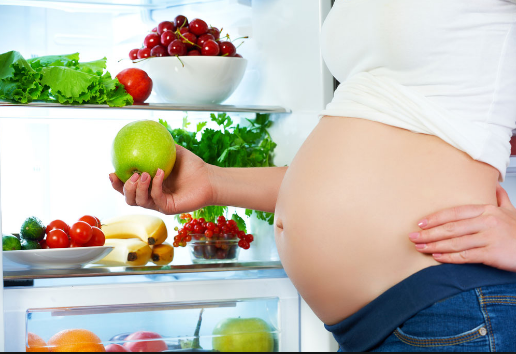Foods for Pregnancy- Pregnancy comes with a whole lot of complications and therefore with this timing, your body needs additional nutrients, vitamins and minerals and therefore, a healthy diet must be maintained. A diet lacking in key nutrients may negatively affect the baby’s development as well as the mother. Food for Pregnancy must be carefully selected such that will make it a lot easier to lose the pregnancy weight after you’ve given birth.

Foods for Pregnancy
Here are 11 nutritious Foods for Pregnancy to help the health of you and your baby
- Dairy Products
Dairy products contain two types of high-quality protein: casein and whey which are the best dietary source of calcium, and provides high amounts of phosphorus, various B vitamins, magnesium and zinc.
Greek yogurt is particularly beneficial for pregnant women because it contains more calcium than most other dairy products. Some varieties also contain bacteria called Probiotics which support digestive health and helps reduce the risk of complications.
-
Legumes
This group of food is highly rich in protein and they include; lentils, peas, beans, soybeans and peanuts. All women need 10 extra grams of protein a day during pregnancy; beans and lentils are an excellent source, with about 15 grams per cup. They are plant sources of fiber, protein, iron, folate (B 9) and calcium — all of which your body needs more of during pregnancy.
Folate is one of the B vitamins (B 9). It’s very important for the health of the mother and fetus, especially during the first trimester. Insufficient folate intake may also cause the fetus to become more prone to infections and disease later in life as well as a low birth weight.
-
Salmon
Pregnant women are not getting nearly enough omega-3 through their diet which has its source from sea foods especially in Salmon. They are very essential in their addition in foods for pregnancy because they build the brain and eyes of your fetus but the mercury content in it has made the eating very limiting.
However, studies have shown that pregnant women who eat 2–3 meals of fatty fish per week achieve the recommended intake of omega-3 and increase their blood levels of EPA and DHA.
- Eggs
Eggs are a great source of choline which is essential for many processes in your body, including brain development and health. “If eggs are cooked, the risk of a bacterium, salmonella which causes fever, vomiting, diarrhea is minimum. Eggs are the ultimate meal as they contain a little bit of almost every nutrient you need. Many women develop aversions to meat while pregnant. Eggs are an excellent alternative protein source, since they contain all the essential amino acids your body needs, says Hattner. Low choline intake during pregnancy may increase the risk of neural tube defects and possibly lead to decreased brain function in the fetus. An omelet with lots of chopped vegetables and a bit of cheese just goes so well for dinner.
-
Broccoli Leafy Greens
Broccoli and leafy vegetables, such as spinach, are a good list of foods for pregnancy because they contain many of the nutrients pregnant women need.
These include fiber which help prevent constipation which is a very common problem among pregnant women, vitamin C, vitamin K, vitamin A, calcium, iron, folate and potassium. They are rich in antioxidants. They also contain plant compounds that benefit the immune system and digestion and is linked to a reduced risk of low birth weight
- Lean Meat
Beef, pork and chicken are excellent sources of high protein as long as you heat it first to kill bacteria.
Furthermore, beef and pork are also rich in iron which is an essential mineral which red blood cells use as a part of hemoglobin for blood volume especially during the third third-quarter of the pregnancy. Choline and other B vitamins is needed in higher amounts during pregnancy. If you don’t have good iron stores, you’re more likely to feel tired,” warns Jo Ann Hattner, RD, a dietitian in Palo Alto, California.
The importance of iron cannot be overemphasized as low levels of iron during early and mid-pregnancy may cause anemia.
-
Caffeine
Stronger studies have shown that caffeine is not harmful in moderate amounts. Consuming very high amounts is linked to miscarriages, so you may want to cut down on coffee during pregnancy. So not more than 250 milligrams per day, the amount found in two 8-ounce cups of coffee. However, some women may feel more sensitive to caffeine during pregnancy. And that comes as a relief to many moms-to-be. I definitely would have my mocha latte at just this amount when am pregnant.
- Alcohol
Heavy drinking leads to Fetal Alcohol Syndrome (FAS), which causes mental retardation and a host of abnormalities. Alcohol is a big X during pregnancy, but many doctors still advise their patients that an occasional wine is okay. But according to the CDC and the U.S. Surgeon General, even moderate drinking may cause brain damage so it’s better to avoid totally than be pitted for.
-
Whole Grains
Whole grains may help pregnant women meet their increased calorie requirements such as Oats and Quinoa, especially during the last six months. They are generally rich in B vitamins, fiber and magnesium. All of these are frequently lacking in the diets of pregnant women
- Water
Water, a basic need for any condition and so must be in adequate quantity to avoid mild dehydration which includes; headaches, anxiety, tiredness, and reduced memory. Increasing your water intake may help relieve constipation and reduce your risk of urinary tract infections, and as well increase your blood volume which is common during pregnancy. At least, 2 liters of water per day is just fine.
You are what you eat always.